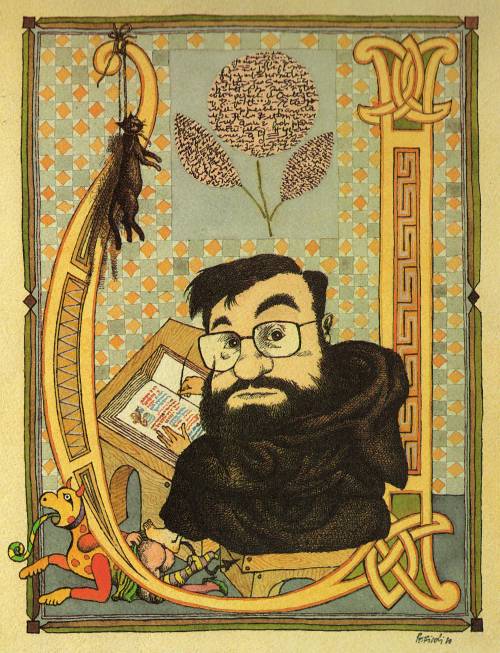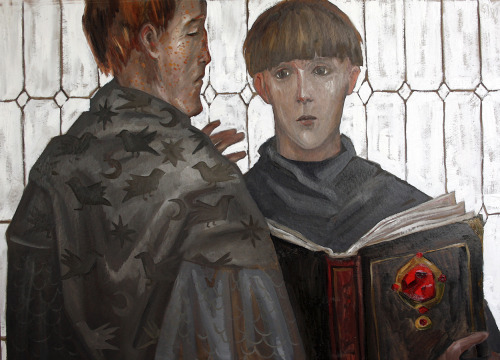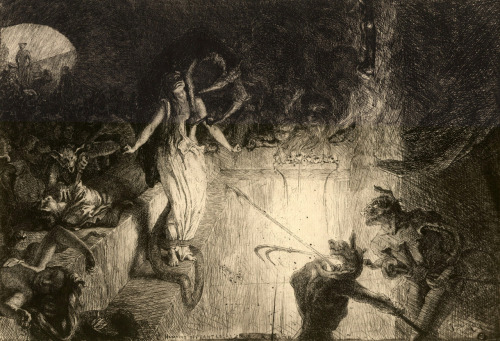#umberto eco
‘The thought that all experience will be lost at the moment of my death makes me feel pain and fear… What a waste, decades spent building up experience, only to throw it all away… We remedy this sadness by working. For example, by writing, painting, or building cities.’
Umberto Eco (January 5, 1932 – February 19, 2016)
but also…
“Chi non legge, a 70 anni avrà vissuto una sola vita: la propria. Chi legge avrà vissuto 5000 anni: c'era quando Caino uccise Abele, quando Renzo sposò Lucia, quando Leopardi ammirava l'infinito… perché la lettura è un'immortalità all'indietro.”
Post link
Trying to envisage the alternate world in which the media I favor were popular and the sort of discourse that would erupt.
Annihilation discourse?
Trails of Cold Steel discourse?
Lawrence of Arabia discourse?
His Dark Materials discourse (we had that for a while, but it died down)
Umberto Eco discourse? Borgesdiscourse?
The point is that I’m not better than anyone. But by God I amlucky.
Can you imagine the cultural appropriation discourse about Diotallevi
or absolutely anything involving Captain Simonini
“See here. In the world, there are morons, idiots, fools, and lunatics.”
“Is anyone left out?”
“Yes, such as the two of us. Or at least, to be polite, me. But, really, anyone belongs to one of these groups. Each of us is, once in a while, a moron, an idiot, a fool, or a lunatic. Let’s say the ideal person is the one who mixes in a reasonable proportion these components. […] Don’t take my theory for spun gold. I’m not setting the universe in place; I’m just saying what is a lunatic to a publishing house. […] The moron can’t talk or move at all; he lacks coordination. He enters a revolving door the wrong way.”
“How?”
“He can; that’s what makes him a moron. We don’t care about him; you can recognize him immediately, and he does not come to us to publish a book. Let’s pass over.”
“Let’s.”
“Idiocy is more complex. It’s social behavior. The idiot speaks outside the glass.” […] He pointed at the table outside his glass. “He would speak of what’s inside the glass, but as it is he speaks outside of it. In common terms, if you will, he does faux pas, the one who asks how’s your wife doing to the guy whose wife just left him. […] He makes everyone awkward, but gives them something to talk about. At his best, he’s a diplomat, he draws attention from someone else’s faux pas. But we don’t care, he’s not creative, he’s derivative, so he doesn’t submit manuscripts to publishers. The idiot doesn’t say that cats bark, he talks about cats when others are talking about dogs. He gets conversation wrong, and when he does it properly, it’s sublime. […] The idiot is Joachim Murat, who reviews his officers, and sees one, covered in medals, from Martinique. ‘Vous êtes nègre?’ [You’re a black man, aren’t you?] he asks. And that one: ‘Oui mon général! [Yes, my general!] And Murat: ‘Bravò, bravò, continuez!’ [Good, good, keep it up!] And so on. Do you follow? Excuse me if I drink another one, I’m celebrating a momentous decision: I’ve stopped drinking. Say nothing, you’ll make me feel guilty.”
“What about fools?”
“Ah. The fool is not wrong in behavior, but in reasoning. He’s one to say that all dogs are pets, and all dogs bark, but cats are pets as well, and therefore bark. Or that all Athenians are mortal, all people from Piraeus are mortal, therefore all people from Piraeus are Athenians.”
“Which is true.”
“Yes, but by chance. A fool may say the right thing, but for the wrong reason.”
“We can say wrong things, but at least let the reason be right.”
“By God, yes. Otherwise, why bother being rational animals? […] The fool is subtle. You can recognize at once an idiot (let alone a moron), but the fool reasons almost as you do, except for a minuscule deviation. He’s a master of paradox. Many books by fools are published, because they are convincing at first sight. A publisher can’t be expected to recognize fools. Scientific academies don’t, why should publishers?”
“Philosophy doesn’t. Saint Anselm’s ontological argument is foolish. God must exist because I can think of him as the being with all perfections, including existence. He confuses existence in thought with existence in reality.”
“Sure, but the refutation by Gaunilo is foolish as well: I can think of an island in the sea even if it’s not there. He confuses thought of contingence with thought of necessity.”
“A duel of fools.”
“Of course, and God laughs himself silly. He made himself unthinkable just to prove that Anselm and Gaunilo were fools. What a sublime purpose for creation!” […]
“How deep. It’s two AM, the bar’s about to close, and we’re still missing lunatics.”
“Here they are. You can recognize the lunatic: he’s a fool with no craft. The fool tries to prove his point, his logic is twisted but it’s there. The lunatic doesn’t bother to have a logic, he proceeds by short-circuits. To him, everything proves everything else. The lunatic has an obsession, and to confirm it everything goes. You can recognize the lunatic from the freedom he takes from the duty to find evidence, from his penchant for enlightenment. And this may seem strange to you, but sooner or later the lunatic mentions the Knights Templar.”
– Umberto Eco, Foucault’s Pendulum (1988), chapter 10
In the name of rose | Jean-Jacques Annaud | 1986
yığınla bilgileri ona zeka bahşetmedi.
umberto eco - antik yunan
bence kötülük, bir tür salaklıktan başka bir şey değil.
brecht - sezuan'ın iyi insanı
bir şişenin içinde hapisti; çocuklar ona “cadı cadı, bir isteğin var mı?“ diye sorduklarında, onlara “ölmek istiyorum,“ diye cevap vermişti.
alberto manguel - ulises'in dönüşü
The ghost empire announces itself. A QAnon-style video with QAnon’s enemies as the (anti)heroes. (Then again, where do you think QAnon came from?)
The goal is universal paranoia: to taint all information as misinformation and with this omni-skepticism to demobilize the public. Cordoning off information from misinformation isn’t going to be possible forever because there is no such boundary in experience, especially online experience; and not-too-bright Boomers who religiously watch The ViewandMorning Joe are a dwindling resource. So you break the whole society the way they broke the ‘60s militants: you don’t need entryists and informers if everybody thinks everybody else is an entryist or informer. And who’s to say what anybody’s motive is anyway? Just sit back and enjoy the ride.
The paranoids in the YouTube comments are already interpreting the scene where the witch unmasks the clown as a shot fired from military intelligence to CIA (i.e., “Clowns in America.”) Hermeneutics, baby! Or as we used to call it in my adjunct days in the English department, Textual Analysis.
A good day, maybe, to revisit my essay from that flaming summer of 2020 on Foucault’s Pendulum. Here are the ultra-paranoid opening paragraphs:
A strange series of coincidences, difficult to dismiss as chance, recently convinced me that I had to read Foucault’s Pendulum. First, the book itself appeared, “unbidden,” as the literary novelists always say. A few weeks ago, I found a hardcover in good condition inside a Little Free Library that usually boasts only children’s books and pop fiction. The LFL in question is, by the way, shaped like mailbox: was Someone sending me a message?
The mystery deepened only a week after I’d plucked the book from the box. I had been re-watching Chris Carter’s downbeat conspiracy-themed late-’90s TV series Millennium for the first time in many years, on the theory that the deliriously psychedelic conclusion to the controversial second season, in which an outbreak of the Marburg virus threatens to decimate America, might be newly relevant in “the age of coronavirus.” A few episodes before that apocalyptic finale, however, comes a tale that caught my paranoid eye. An episode titled “Anamnesis” is about gnosticism, matriarchal cults, and black madonnas; scripted by a female writing duo, it’s the only episode in all three seasons not to star the main male protagonist, featuring instead a team-up between his wife and his female sidekick; “Dancing Barefoot” plays, and “Thunder, Perfect Mind” is recited. Longtime readers of my work will know what I was thinking: that this episode, aired about a year after the novel’s publication, was inspired by Toni Morrison’s gnostic and female liberationist fantasia Paradise.
A bit of Internet sleuthing, though, demonstrated to me that no one had made the connection, and that the writers didn’t claim such an influence. On the other hand, I discovered that all the elements I’d associated with Morrison were there in Foucault’s Pendulum, precisely the novel I had found by chance just days before. Since Morrison has several times mentioned her admiration for Eco, it’s not out of the question that he influenced her or, perhaps more aptly, moved her to a counter-statement on some of the same themes. It’s also likely that this conspiracy-soaked occult novel affected the writers of Millennium, among many other late-20th-century gnostic revivalworks.
Finally, canvassing the Wikipedia entry on the novel before I read it, I found that among the endless occult paraphernalia Eco packed into the text was “[a]n obscure one-time reference to the fictional Cthulhu cult through a quote from The Satanic Rituals—‘I’a Cthulhu! I’a S’ha-t’n!’. The words closed a ritual composed by Michael Aquino.” Aquino was a high-ranking Satanist and a psychological warfare expert for the U.S. military; he co-wrote the notorious Pentagon position paper “From PSYOP to MindWar: The Psychology of Victory”. Understandably, he recurs again and again in the annals of American conspiracy theory: the politically paranoid on the right abominate him for his Satanism, while those on the left loathe his anticommunist and militarist commitments. Through a vector I’m not at liberty to disclose, I am only two of the proverbial degrees of separation away from Aquino, though I have obviously never met him or had anything to do with him or even discussed him with anyone who has. I imagine conspiracy theorists will promulgate this curious fact widely on the Internet to discredit me whenever I finally become as famous as I deserve to be, considering that I am one of America’s great writers. (Megalomania and paranoia: like horse and carriage.) Two days after I made the Aquino-Eco-Millennium connection, it was announced on Twitter that Aquino had died. Yes, Someone was trying to tell me Something: I dutifully took up Foucault’s Pendulum and began to read.
I did answer the question posed in that last paragraph about my nonrelational connection to Aquino here, but you’re going to have to subscribe if you want to listen. Since DF sees the future in this bewildering epoch, I’d say it’s worth it.

brother William of Baskerwille / “Il nome de la Rosa” - “The name of the Rose”
Commissions are open :)
Adso in the Library * illustration to “The Name of the Rose” of Umberto Eco
Welcome with commissions!:)
Post link
Brother William of Baskerville and Adso of Melk
.
Illustration to “The name of the Rose” of Umberto Eco
.
Commissions are open! Welcome:)
Post link
Hello!
Dear friends!
I remind you of commissions inside the Bluebeard’s art crypt!
If you also love Tolkien, PotO, celtic myths, Umberto Eco or Medieval history, I’ll be happy to draw for you a watercolourorgraphic illustration. Though I’ve written my favorite themes, please feel free to wrime me with any your ideas!
There’re two options:
1. A scan of an artwork I draw for you - 30$
2. The original I send you by snail mail on A4 - 45$
If you take2illustrations, prices for the second piece are 5$ less (25$ or 40$)
Payment by PayPal.
Best regards,
Bluebeard:)
Post link
“There is a body that enfolds the whole of the world; imagine it in the form of a circle, for this is the form of the Whole… Imagine now that under the circle of this body are the 36 decans, midway between the total circle and the circle of the zodiac, separating these two circles and, so to speak, delimiting the zodiac, transported along it with the planets… The changing of kings, the rising up of cities, famine, plague, the tides of the sea, earthquakes: none of these takes place without the influence of the decans…”
~ Corpus Hermeticus, Stobaeus, excerptum VI (from the Umberto Eco’s “Foucault’s Pendulum”, chapter 4)
Post link
△“It’s a wonderful story. Did you know that our universe is the result of an error and that it’s partly my fault? Sophia was the female part of Absolute, because Absolute then was more female than male; it was you men who later put a beard on him and started calling him He. I was his good half. (…) I tried to create the world without asking permission—I, the Sophia, who is also called—the Ennoia. But my male part didn’t want to create; maybe he lacked the courage or was impotent. So instead of uniting with him, I decided to make the world by myself. I couldn’t resist; it was through an excess of love. Which is true; I adore this whole mixed-up universe. And that’s why I’m the soul of this world. (…) ~ You mean the Demiurge? ~ That’s him, yes. Or maybe it wasn’t Sophia who made this Demiurge; maybe he was already around and she egged him on: Get moving, silly, make the world, and then we’ll have real fun. The Demiurge must have been a real screwup, because he didn’t know how to make the world properly. In fact, he shouldn’t even have tried it, because matter is bad, and he wasn’t authorized to touch the stuff. Anyway, he made this awful mess, and Sophia was caught inside. Prisoner of the world.”▼
~ Umberto Eco (,Foucault’s Pendulum’, chapter 5 Gevurah/50) Pictures: 1. Anima Mundi = Sophia; 2. art by Marcel Roux; 3. Virgin Mother.
Post link
“If by intellectual you mean somebody who works only with his head and not with his hands, then the bank clerk is an intellectual and Michelangelo is not. And today, with a computer, everybody is an intellectual. So I don’t think it has anything to do with someone’s profession or with someone’s social class. According to me, an intellectual is anyone who is creatively producing new knowledge. A peasant who understands that a new kind of graft can produce a new species of apples has at that moment produced an intellectual activity. Whereas the professor of philosophy who all his life repeats the same lecture on Heidegger doesn’t amount to an intellectual. Critical creativity — criticizing what we are doing or inventing better ways of doing it — is the only mark of the intellectual function.”
~ Umberto Eco (“The Art of Fiction, No. 197”, The Paris Review/Summer 2008, No. 185, Art by Michael Taylor)
~ Ps. My dad always said:“You cannot learn to be ,intelligent’, no school or academic title give you that… With ,intelligence’ you can only born. That’s why we have many educated people, so many times more stupid than these without education, and only few, over the centuries, so-called: geniuses.” I agree with that… I think Eco was one of the few geniuses in our century we had honor to know up close.
Post link
Review: The Prague Cemetery, by Umberto Eco

★ ★ ★ ★ ☆
“There’s a lot to be unpacked here” would be the understatement of the century. In a 19th-Century Europe packed with xenophobia, burgeoning nationalist movements and flourishing conspiracy theories, Umberto Eco uses the life, work, and struggle with amnesia of a misanthropic, xenophobic spy, traitor, and expert forger to draw a light on everything going wrong in politics today (and everything that went wrong in the 1920s and 30s). The only fictional characters and aliases are the protagonist/s and his/their own false identities.
The Prague Cemetery opens with 14 pages of the narrator describing just how much he hates pretty much everyone. If that’s not to your taste you can pretty much put the book down there. His vitriolic episodes are briefer from there on, but his hatred of everyone and everything except forgery, good food, and the satisfaction of seeing someone murdered because of false evidence he created is a constant thread throughout the rest of the book.
We definitely aren’t meant to like this guy - although I don’t doubt that, in today’s political climate, many readers did. Hopefully that’s enough to string them along until the book’s message hits; hopefully they actually understand what Eco is getting at and go away and think about it.
Simonini makes his living largely on forgeries and fraud. After he creates false evidence that sees his employer imprisoned, the government realises just how useful he could be in doing away with enemies of the state - whether it’s by creating false evidence to put in the hands of the courts, or publishing false news. As he hones his skill, the reach of his false news grows from from the occasional publication in pre-existing broadsheets and newsletters to a whole range of newspapers and magazines wholly devoted to entirely fabricated stories intended to drum up xenophobia and antisemitism. Sound familiar?
Maybe some of the book is a little ambiguous when it comes to Eco’s politics. His protagonist is a key figure in the fake news that government and shadow-government groups are using to twist the population’s emotions and opinions to serve their needs, after all. But he devotes plenty of the book to tearing down exactly this kind of thing:
Patriotism is the last refuge of cowards; those without moral principles usually wrap a flag around themselves, and the bastards always talk about the purity of the race… The meaning of identity is now based on hatred, on hatred for those who are not the same.
And later, even more reminiscent of Trump (though I don’t doubt that the current situation in Italy weighs even more heavily on Eco’s mind):
The stupidity of these people is such that even today, if I were to say I’ve been fooling them, they wouldn’t believe me.
The Prague Cemetery is no mere period piece. The parallels to the banal horror of today’s media and politics, and the book’s central message, will be as clear as daylight to anyone who already agrees with Eco. I just hope the moral of the story doesn’t fly over the heads of those inevitable readers who’ll be drawn to the book because they see themselves in Simonini, though in reality they’re more like the densest and most credulous of his believers.

My current read: The Prague Cemetery, by Umberto Eco. A straight-up villain and all-round arsehole is the protagonist. I’m pretty sure that on one level it’s an allegory for the current situation in politics and news media (primarily in Italy, but pretty much anywhere), but I’d also find it a bit easier to follow the plot and grasp the setting if I had an intimate understanding of 19th-Century Italian political history.
Includes a bunch of illustrations from the period. Most of them are so good, and so fitting, that I thought they were commissioned especially for the book. Others have visible jpg artifacts.
everyone talks about tolkien’s lengthy descriptions of trees and forests, but i have yet to hear anyone mention umberto eco’s FIVE PAGE LONG CONFUSING DESCRIPTION OF A DOOR
















